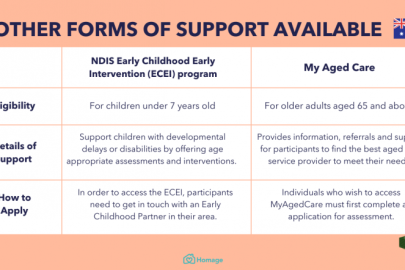Innovations in NDIS Home Care: Revolutionizing Disability Support Services
As the landscape of disability support services evolves, so does the National Disability Insurance Scheme (NDIS) in Australia. With the aim of enhancing the quality of life for individuals with disabilities, innovations within NDIS home care are paramount. These advancements not only streamline processes but also ensure that participants receive tailored, efficient, and effective support. Let’s delve into some of the groundbreaking innovations reshaping NDIS home care services.
Telehealth and Remote Monitoring
In an era where connectivity is paramount, telehealth and remote monitoring have emerged as game-changers in NDIS home care. Through the integration of digital platforms and wearable technology, individuals can access healthcare services and support remotely. This innovation not only increases accessibility for participants, especially those in rural or remote areas, but also promotes timely intervention and proactive care management.
Providers equipped with telehealth capabilities can conduct virtual consultations, monitor vital signs, and offer guidance on medication management and therapy exercises. Furthermore, remote monitoring devices can alert caregivers and healthcare professionals in case of emergencies or deviations from normal health parameters, ensuring prompt assistance.
Personalized Care Plans Utilizing AI
Artificial Intelligence (AI) is revolutionizing the development and implementation of personalized care plans within the NDIS framework. By analyzing vast amounts of data, AI algorithms can generate insights into participants’ unique needs, preferences, and health conditions. This data-driven approach enables providers to tailor support services accordingly, optimizing outcomes and enhancing participant satisfaction.
AI-powered systems can predict potential challenges, recommend appropriate interventions, and adapt care plans in real-time based on evolving circumstances. This proactive and adaptive approach ensures that participants receive the right support at the right time, fostering independence and well-being.

Smart Home Automation
Smart home automation technology is reshaping the way individuals with disabilities interact with their living environments. Integrating NDIS home care with smart devices allows for greater independence and autonomy. From voice-activated assistants to smart lighting and climate control systems, these innovations empower participants to perform daily tasks with ease and efficiency.
Moreover, smart home sensors can detect movement patterns, monitor sleep quality, and even remind individuals to take medication or attend scheduled appointments. This not only enhances safety and security but also provides peace of mind for participants and their caregivers.
Virtual Reality Therapy
Virtual Reality (VR) therapy is emerging as a novel approach to addressing various physical and cognitive challenges faced by individuals with disabilities. Within the realm of NDIS home care, VR technology offers immersive experiences that aid in rehabilitation, pain management, and cognitive stimulation.
Participants can engage in virtual simulations tailored to their therapeutic goals, such as mobility training, sensory integration, or relaxation exercises. VR environments provide a safe and controlled setting for practicing real-life scenarios, thereby enhancing confidence and functional abilities.
Collaborative Care Platforms
Collaborative care platforms serve as centralized hubs for coordinating and managing NDIS home care services efficiently. These integrated systems facilitate seamless communication and collaboration among participants, caregivers, support workers, and healthcare professionals.
Through secure portals and mobile applications, stakeholders can access relevant information, schedule appointments, track progress, and share updates in real-time. This fosters transparency, accountability, and continuity of care, ultimately improving the overall service delivery experience.
Conclusion
Innovations in NDIS home care are driving positive transformations in the disability support sector, empowering individuals to lead fulfilling and independent lives. From telehealth and AI-driven care planning to smart home automation and virtual reality therapy, these advancements offer tailored solutions that enhance accessibility, efficiency, and effectiveness.
As technology continues to evolve, the potential for further innovations in NDIS home care remains vast. By embracing these advancements and fostering collaboration across stakeholders, we can continue to revolutionize disability support services and create inclusive communities where everyone can thrive.
For individuals with disabilities and their caregivers, these innovations represent not just advancements in technology, but also hope for a brighter and more inclusive future.




